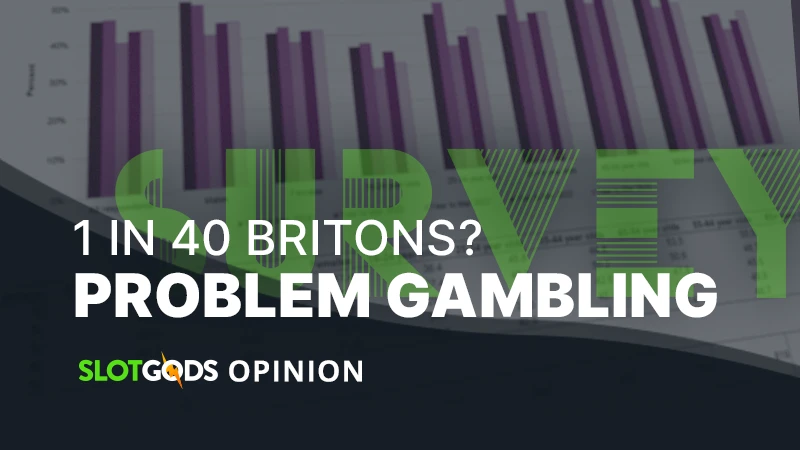1 in 40 Britons are problem gamblers… really!?

Problem gambling is given a high profile by regulators, lawmakers and the gambling industry. So often the focal point of legislation, and ostensibly one of the main aims of the current redraw of the Gambling Act in the UK, protecting the vulnerable while allowing others to play freely, is firmly in the spotlight.
Now, new research from the Gambling Commission suggests as many as 1 in 40 people in the UK is a problem gambler. Extrapolating this figure out puts the total number of problem gamblers in the UK at around 1.7 million.
The figures were derived from a study of 4,001 people, the first launched under the Gambling Commission’s new schema for surveying and collecting day. Of those surveyed, half reported gambling in the previous month, with 2.5% of respondents scoring more than 8 on the Problem Gambling Severity Index. This score classifies them as problem gamblers.
A further 3.5% of respondents scored between 3 and 7 points on the Index, which suggests they are moderate-risk gamblers.
The figures are startling and significantly higher than previous research has indicated. So has there been a sudden, overnight explosion in problem gambling, or is the data flawed?
Perhaps more pertinently, has the issue of problem gambling been massively underestimated for years relative to reality, or is this an alarmist attempt at furthering the Commission’s current drive to tighten up gambling rules?
A common sense check on the data
As a starting point, it’s worth applying a common sense check to these numbers. If half respondents hadn’t gambled at all in the past month, that means 1 in 20 of those that did gamble have a problem. This includes anyone in the survey who gambled in the past month, including the most light-touch casual gamblers – someone who buys an occasional scratchcard, lottery ticket or puts a bet on a cup final.
Note also that survey data was collected between April and May 2023, which puts it squarely over the period of the Grand National and the end of the football season – an annual high watermark for casual betting activity.
Further analysis of the data exposes flaws in the survey methodology. Of 4,001 people surveyed 2,032 were male and 1,969 female – a reasonable ratio to examine. But when it comes to breaking those 4,001 people down by age, the numbers pan out as follows:
16-24 year olds x 331, 25-34 year olds x 358, 35-44 year olds x 382, 45-54 year olds x 503.
And then, startlingly, 55-64 year olds x 821 and over 65s x 1606.
Why such a skewing to older people in the survey pool? While 4,001 works, credibility-wise, as a pure, overall figure – the way that figure is made-up in terms of age ranges surveyed raises concerns about the credibility of the survey process. Which other components of the survey might not stand up to even the most perfunctory scrutiny?
So, from the half of people surveyed who gambled in the previous month, including those betting casually, 1 in 20 are supposedly 'problem gamblers'. This figure feels hard to believe.
Consider this from a different angle: previously reported data and estimates. Multiple surveys and studies in the recent past have put the 'problem' figure at about 0.3% to 0.5% with the Gambling Commission’s own Gambling-related harms evidence review placing the figure at 0.5% of the adult population, which is in itself at the higher end of general estimates.
Taken at face value, the jump from 0.5% (1 in 200) to 2.5% (1 in 40) indicates five times as many people as we thought are battling gambling issues. This of course begs another question – if these latest figures are correct (or a more accurate reflection of the issue) then how were the previously reported figures so wrong?
What's going on with the numbers?
The Gambling Commission is currently consulting over proposals that will result in a tighter regulatory environment for gambling companies. There is no doubt that the measures trailed for consultation will impose new compliance burdens on slots sites, sports betting sites and the like – all under the guise of protecting those at risk from gambling harms.
At the same time, the UKGC has changed its figures for computing data and introduced a whole new methodology for surveying the public. The Commission even accepts that the new methodology of allowing people to self-report online could lead to higher figures than normal, and stresses that no comparisons with previous figures can be made on this basis.
However, publishing a survey with the headline that 1 in 40 Britons are problem gamblers is always likely to gain attention and in the process, distort the views of the public, and potentially lawmakers. It also makes for ideal fodder for the tabloids.
It would be going too far to accuse the Gambling Commission of wilfully misrepresenting the figures to drive an agenda. But especially with their own warnings to industry about their use of statistics and figures, it's deeply concerning to see findings like these make their way to the headlines without the relevant context.
There's no doubt that problem gambling is an issue, and the industry and regulators are right to do all they can to tackle it. But conversations around how best to prevent gambling harms without unduly impacting on gambling freedoms and ability for operators to function must remain transparent on both sides.
Regulators need to understand that statistics must be handled with care, so all sides can approach the debate from a position of trust and agreed mutual understanding. Changing research methodologies and in the process sensationalising findings does little to advance this conversation in a rational, productive manner.
